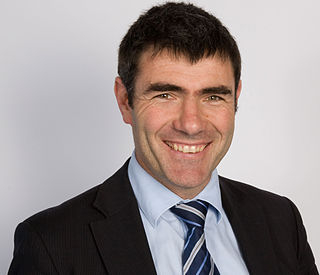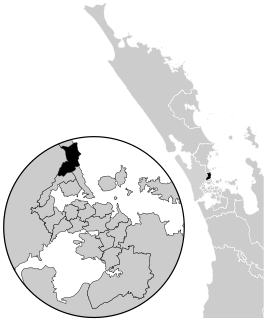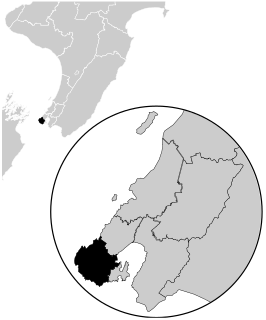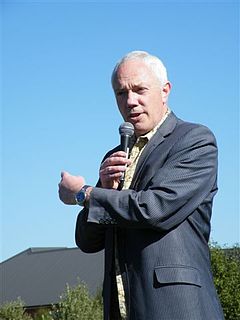History
The People's Choice Party was formed in 1999 by Rusty Kane [2] and Doug Wilson. [1] Wilson had previously held a protest walk from New Plymouth to Wellington, during which he collected 56,000 signatures for a petition. [2]

New Plymouth is the major city of the Taranaki Region on the west coast of the North Island of New Zealand. It is named after the English city of Plymouth from where the first English settlers migrated. The New Plymouth District, which includes New Plymouth City and several smaller towns, is the 10th largest district in New Zealand, and has a population of 74,184 – about two-thirds of the total population of the Taranaki Region and 1.7% of New Zealand's population. This includes New Plymouth City (58,300), Waitara (6,483), Inglewood (3,380), Oakura (1,359), Okato (561) and Urenui (429).

Wellington is the capital and second most populous urban area of New Zealand, with 418,500 residents. It is located at the south-western tip of the North Island, between Cook Strait and the Remutaka Range. Wellington is the major population centre of the southern North Island, and is the administrative centre of the Wellington Region, which also includes the Kapiti Coast and the Wairarapa. It is the world's southernmost capital of a sovereign state. Wellington features a temperate maritime climate, and is the world's windiest city by average wind speed.
Wilson stood for the 1998 Taranaki-King Country by-election as a candidate for People's Choice. [1] The People's Choice Party was officially registered before the 1999 election, [3] which required at least 500 paid members. The party contested the 1999 general election [4] to show opposition to the MMP voting system[ citation needed ] and received 387 party votes and a total of 154 electorate votes in two electorates. [4] This included Kane standing in the Te Tai Hauāuru Maori electorate, the first non-Maori to stand in that seat. [2]
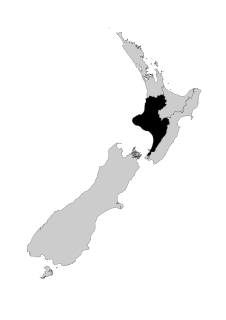
Te Tai Hauāuru is a New Zealand parliamentary Māori electorate, returning one Member of Parliament to the New Zealand House of Representatives, that was first formed for the 1996 election. The electorate was represented by Tariana Turia from 2002 to 2014, first for the Labour Party and then for the Māori Party. Turia retired and was succeeded in 2014 by Labour's Adrian Rurawhe who again retained the seat in 2017.
The party was deregistered after Doug Wilson's retirement in 2002.[ citation needed ] However, it continued to act as an unregistered party and Rusty Kane remained active in politics. As of 2015, Kane had unsuccessfully stood in six national elections, run for the Stratford mayoralty, the Taranaki District Health Board, twice for a place on the Taranaki Regional Council, and once for the New Plymouth council. [5] He also ran for Bay of Plenty Regional Council in 2016. He has frequently stood for electorates and local councils for areas he does not live and has been described as a "serial campaigner" [5] and as "the man who runs more than a nose during winter". [6] Kane has run sometimes under the People's Choice banner and sometimes as an independent; he also joined the Conservative Party but left in 2012 citing its 'anti-gay stance'. [7]
Kane has described the party as a "ginger group, set up to advocate a political voice on behalf of small groups and individuals". [8] Kane has stated that the party seeks to highlight issues, not to win seats. [8] For example, the party stood in the 2009 Mt Albert by-election [9] to support the binding of Citizens Initiated Referenda.[ citation needed ]
A ginger group is a formal or informal group within an organisation seeking to influence its direction and activity. The term comes from the phrase ginger up, meaning to enliven or stimulate. Ginger groups work to alter the organisation's policies, practices, or office-holders, while still supporting its general goals. Ginger groups sometimes form within the political parties of Commonwealth countries such as the United Kingdom, Canada, Australia, New Zealand, India, and Pakistan.

Referendums are held only occasionally by the Government of New Zealand. Referendums may be government-initiated or held in accordance with the Electoral Act 1993 or the Citizens Initiated Referenda Act 1993. Ten referendums have been held so far. Seven were government-led, and three were indicative citizen initiatives.


